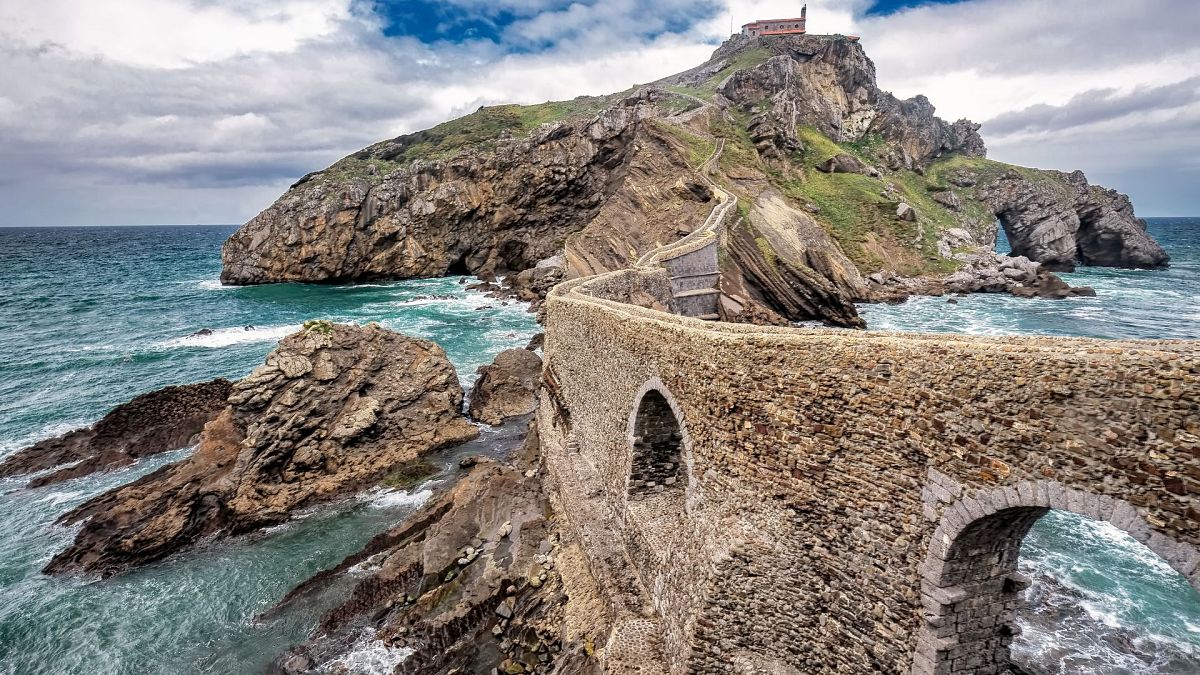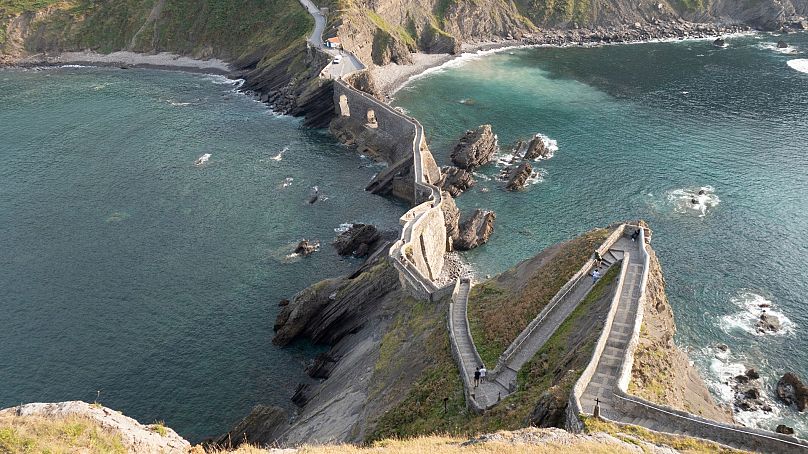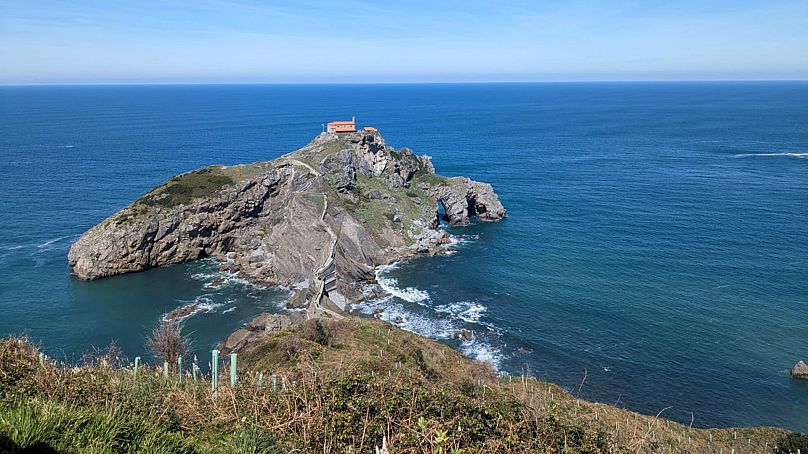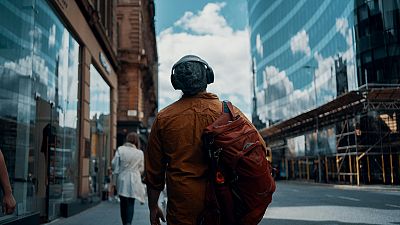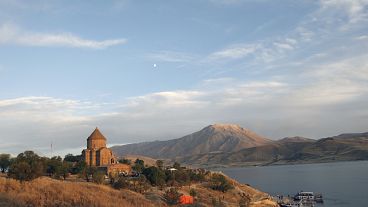‘Tourism has really changed the atmosphere of San Juan,’ one local tells Euronews Travel.
The soaring number of 'Game of Thrones' fans flocking to the Basque Country’s San Juan de Gaztelugatxe has upset bird breeding in the area and ruffled feathers among locals.
Local authorities have been forced to introduce an online ticketing system to control visitor numbers. They have also banned the historic ringing of the church's bell to protect the surrounding habitat.
San Juan de Gaztelugatxe, known as Dragonstone to Game of Thrones fans, has been a destination for pilgrims for centuries. But visitor numbers exploded after the islet was used as a filming location for the hit series in 2016.
Here’s how the Basque beauty spot has been impacted by its HBO stardom.
Bell ringing banned to protect bird breeding at San Juan de Gaztelugatxe
Local authorities first introduced digital tickets in the summer of 2018 after the site struggled to cope with increased footfall.
In 2019, almost 730,000 people visited Gaztelugatxe, 140,000 more people than the previous year and an increase of almost 25 per cent in just one year. On 15 August 2019, 6,434 visited the islet in just one day.
In order to reach the church atop the islet, visitors must first climb the 241 steps that wind upwards. After taking in the stunning views of the Basque coast stretching out before them, visitors would traditionally ring the church’s bell three times. The ringing of the bell is supposed to ward off bad spirits and bring good luck.
The island is also said to bring luck to the local fishing community. Boats heading out to sea from the nearby fishing town of Bermeo usually make several turns to port and starboard to gain the favour of San Juan (Saint John).
While fishing boats are still allowed to turn as they please, visitors are now banned from ringing the church’s bell on all but special festival days. The managers of the space removed the bell’s rope as the increased ringing was causing nearby nesting marine birds to become stressed, affecting their breeding habits.
Gaztelugatxe’s pre-booking system is 'a joke', say locals
Since March 2020, it has been obligatory to book a slot to gain access to the islet. While booking a slot is free, this must be done in advance with tickets for certain days sometimes running out.
Maialen Carbó, a 25 year old who lives in the nearby sea-side town of Bakio, where most tourists start their visit from, describes the increased popularity of the local site as “disastrous”.
“The buses, which are already infrequent, are now full of tourists who want to visit the area, taking the places from people who live in Bakio and need to use the local transport.
“It’s a joke that locals have to now ask to visit a place on their doorstep that they have always been able to freely visit before.”
For 24 year old Ane Arostegi, the area holds a personal connection.
“My aunt got married in the church and then went scuba diving to give flowers to the virgin who is under the water. That’s something you couldn’t do now. You would have to ask for too many permits.
“Tourism has really changed the atmosphere of San Juan. When I was little we often used to go and have picnics there during summer and there was almost nobody there. Now it is impossible to get an appointment.
“It is true that tourism has brought some improvements, such as putting up security fences, but it does not compensate for what they have done to this area of Bakio.”
Of the people visiting Gaztelugatxe in 2019, around 46 per cent came from other areas of Spain, 30 per cent were foreigners and 24 per cent came from the Basque Country. Visitors from the local province of Bizkaia, where Bakio is located, made up just 14 per cent of visitors.
How is Gaztelugatxe mitigating the impacts of overtourism?
As well as capping visitor numbers at just over 3,000 per day and banning bell ringing, local authorities are taking other measures to try and mitigate the negative effects of the site’s newfound popularity.
In April, the Provincial Council of Bizkaia announced it was supporting the creation of a new body which will improve cooperation between different authorities and departments with overlapping responsibilities to ensure the site’s sustainable use.
Work has also been done to increase the size of the nearby car park and create new bus stops to encourage more people to visit by public transport. New coastal walks are also planned which will allow people to walk to the site from Bermeo, not just from Bakio.
Other Spanish regions are cashing in on the Game of Thrones hype
Despite the drawbacks and potential for overtourism, other regions and cities in Spain are aiming to draw fans of the series to their own neck of the woods.
Cáceres, a medieval city and UNESCO site in Spain’s Extremadura region, has already been used as a Game of Thrones filming site and wants more. Season two of the show’s spin-off, ‘House of the Dragon’, has just been filmed there after being courted by local authorities.
The first episode of the spin-off was watched by over 10 million people and will almost certainly lead to an increase in the number of fans visiting the city.
At the moment, the city is welcoming Game of Thrones pilgrims with open arms, even organising an annual Game of Thrones festival. But a look at Gaztelugatxe shows there’s a fine line between more tourism and too much tourism.
